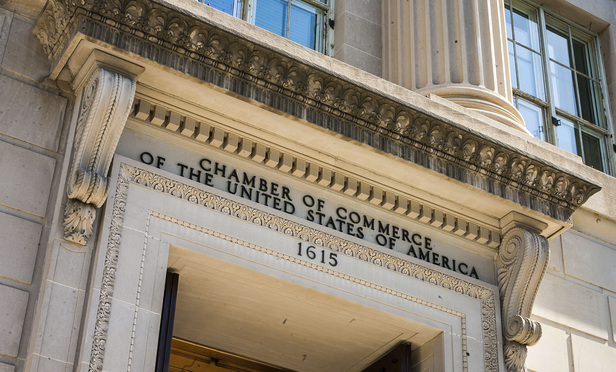 U.S. Chamber of Commerce in Washington, D.C. June 10, 2016. Photo by Diego M. Radzinschi/THE NATIONAL LAW JOURNAL.
U.S. Chamber of Commerce in Washington, D.C. June 10, 2016. Photo by Diego M. Radzinschi/THE NATIONAL LAW JOURNAL.
Prominent business advocacy groups and industry associations are backing the Trump administration in fighting a consumer lawsuit that challenges the lawfulness of a White House executive order calling for the elimination of regulations.
The law firm Sidley Austin, representing groups that include the U.S. Chamber of Commerce and the National Association of Manufacturers, on Monday told a Washington judge that the Trump administration’s plan that agencies eliminate two existing regulations for each new one “is a sensible and reasonable approach to improving the overall efficiency of federal regulations.” The court hasn’t yet accepted the proposed amicus brief.
“The elimination of existing regulations will not be arbitrary, but will focus instead on low-yield regulations that fail to provide sufficient societal benefits when compared to their compliance costs and the benefits offered by competing regulatory programs,” Ryan Morris, a partner in Sidley’s Supreme Court group, wrote in the filing in U.S. District Court for the District of Columbia.
Sidley partner C. Frederick Beckner III, co-leader of the firm’s communications regulatory practice, and partner Samuel Boxerman, in the environmental practice group, were on the brief for the industry and business advocates.
Three groups—including Public Citizen, Natural Resources Defense Council and the Communications Workers of America, AFL-CIO—filed the suit in February in U.S. District Court for the District of Columbia.
“The executive order will block or force the repeal of regulations needed to protect health, safety, and the environment, across a broad range of topics—from automobile safety, to occupational health, to air pollution, to endangered species,” the plaintiffs wrote in their complaint.
U.S. District Judge Randolph Moss last month rejected the government’s request in Public Citizen v. Trump to delay acting on the plaintiffs’ motion for summary judgment and to act first on the government’s motion to dismiss.
The government contends the challengers lack standing to sue, among other arguments. The challengers claim the executive order exceeds the president’s authority, violates his duty under the Constitution’s take care clause and requires agencies to take unlawful and harmful actions.
“The order merely builds on a long and bipartisan history of executive orders that directs agencies to carefully consider the costs of new regulations and to review the effectiveness of existing regulations,” Karen Harned, executive director of the small business legal center at the National Federation of Independent Business, said in a statement Tuesday.
The judge has scheduled briefing in the lawsuit to conclude on or before July 21.
Copyright National Law Journal. All rights reserved. This material may not be published, broadcast, rewritten, or redistributed.
This content has been archived. It is available through our partners, LexisNexis® and Bloomberg Law.
To view this content, please continue to their sites.
Not a Lexis Subscriber?
Subscribe Now
Not a Bloomberg Law Subscriber?
Subscribe Now
LexisNexis® and Bloomberg Law are third party online distributors of the broad collection of current and archived versions of ALM's legal news publications. LexisNexis® and Bloomberg Law customers are able to access and use ALM's content, including content from the National Law Journal, The American Lawyer, Legaltech News, The New York Law Journal, and Corporate Counsel, as well as other sources of legal information.
For questions call 1-877-256-2472 or contact us at [email protected]




